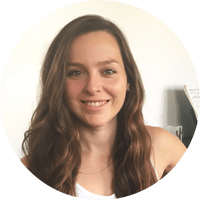I discovered Forbrain about a year ago following a presentation by Kara Tavolacci, an Occupational Therapist based in Paris, France. I was really intrigued about it and thought that it could help a number of the kiddos I work with so, I bought one and haven’t looked back! I try out Forbrain for all of my clients with articulation, language delays and speech sound disorders and have also found it helpful for kids who have a hard time concentrating. Some of the kids don’t like how it feels, and that’s okay, but most of them really enjoy hearing their own voices.
My biggest success story with the Forbrain is with Josephine. Her mother contacted me in July of 2018 with concerns about Josie’s speech - at four years old, she was smart and had a huge vocabulary but was almost completely unintelligible to unfamiliar listeners. When I assessed her, I saw that she had one of the most severe speech sound disorders that I had ever seen. Her speech was filled with unusual substitutions (/s/ and /sh/ became /l/, /f/ and /th/ became /w/), and also had glottal stops present in her speech, so that even simple things like counting were completely unintelligible “one two wee wo wi li le-en”, as was the pronunciation of her own name “do-i-wine”.
The most concerning part was that Josie had no awareness that she was not pronouncing things in the same way as other people; her mother told me that they would frequently have interactions where Josie would ask for something like “lock” (socks) and her Mom would say “oh you mean your sssocks!” and Josie would get mad and say “wa what I laid, my locks!” (“that’s what I said, my socks!”). Josie had started having huge temper tantrums when she wasn’t understood, and her speech was not getting any more intelligible as she got older. I thought she would be in speech therapy for years.

We began therapy in September of this year (2x 30-minute sessions per week), and we used the Forbrain from day one. Josie was absolutely mesmerized by hearing herself so clearly and she couldn’t stop practicing her /s/ while she held the microphone up to her mouth, it was like she had suddenly become aware of her own voice. Josie continued this way with every new sound we introduced, each time practicing the sound to herself while she was wearing the Forbrain (s, z, f, v, sh, ch, th). Two weeks into therapy and Josie ran up to greet me saying “Grace! I used to say “lubway landwiches” and now I can say “sssuubway sssandwiches”!”. Josie’s new sounds generalized into her speech faster than I have ever seen, and six weeks into therapy her speech is completely intelligible to unfamiliar listeners. The only sound substitutions remaining are /th/ to /f/ (which is much more intelligible that the former /th/ to /w/!) and /r/ to /w/, which are substitutions that we can see in typically developing 4-year-olds.
When I saw Josie for therapy last week her Mom was almost in tears telling me about how an old man in the supermarket had asked Josie what her name was, and that he understood her perfectly when she told him “Josephine”.
Forbrain has been an amazing addition to my speech therapy toolkit this year, and I look forward to helping many more Josephine's in the future.

Grace Lindley - Speech & Language Therapist

.png?width=1900&name=blog_banner%20(1).png)

